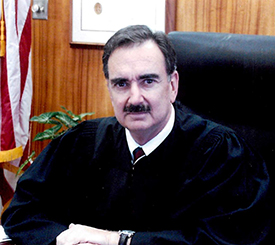Trial on fetal burial law begins with judge's defense of his motives

U.S. District Judge David Ezra. Photo by the U.S. District Court for the District of Hawaii, via Wikimedia Commons.
A trial on the constitutionality of a Texas fetal remains burial law began Monday with a federal judge proclaiming that he has “no predisposition” in the case.
U.S. District Judge David Ezra, sitting by designation in San Antonio, defended himself after the New Orleans-based 5th U.S. Circuit Court of Appeals reversed Ezra’s decision requiring the Texas Conference of Catholic Bishops to reveal internal communications to plaintiffs challenging the law, report the Austin American-Statesman and Courthouse News Service.
In a 2-1 decision issued Sunday, the appeals court had chastised Ezra and a magistrate judge for setting up a hurried schedule for the bishops as they challenged a request for additional documents. A concurring appeals judge went further, wondering if the hurry was part of an attempt to evade appellate review or tax lawyers for the church.
Ezra said he had worked out a rapid pretrial schedule with both sides in the case to accommodate the state of Texas, which wants to enforce the law that had been scheduled to take effect Feb 1. Ezra also said he gave lawyers for Texas a chance to seek his recusal, and they had declined.
The law requires fetal remains to be buried or cremated. At issue in the case is whether the fetal remains law poses an undue burden on women’s access to abortion. If no companies are willing to handle the remains, that could pose an issue, Ezra said as the trial began, according to Houston Chronicle coverage.
The Texas Conference of Catholic Bishops had testified in administrative proceedings before passage of the law that the conference believed fetal remains should be disposed of with respect. Before the law passed, the conference announced it would work with Catholic cemeteries and funeral homes to provide free burial services to fetal remains produced as a result of abortions. State lawmakers passed the law the next year.
The conference was not a party to the case, but Ezra required it to reveal internal communications about its support for the law, including its communications with state officials and other third parties. Using a set of search terms provided by the plaintiffs in the litigations, the conference found more than 6,000 pages of records, and turned over more than 4,300 of those pages.
The plaintiffs sought additional documents that the bishops had withheld, and the magistrate judge ordered the bishops to make their objections under “a tight schedule,” Judge Edith Jones said in the 2-1 decision of the 5th Circuit. The district judge then “hastily concluded” that the withheld documents must be disclosed, Jones said.
“By acting in unnecessary haste,” Jones wrote, the judge deprived the Texas Conference of Catholic Bishops of making its case to quash the discovery.
A concurring judge, James Ho, said the First Amendment expressly guarantees the right of the bishops “to express their profound objection to the moral tragedy of abortion” by offering free burials for fetal remains. “Nothing in the text or original understanding of the Constitution prevents a state from requiring the proper burial of fetal remains,” Ho wrote. “But from the proceedings below, you would think the opposite is true.”
Ho said a 24-hour turnaround for the bishops had been imposed by the district court, leaving “this court to wonder why the district court saw the need to impose a 24-hour mandate on the bishops on a Sunday (Father’s Day, no less), if not in an effort to either evade appellate review—or tax the bishops and their counsel for seeking review. They leave this court to wonder if this discovery is sought, inter alia, to retaliate against people of faith for not only believing in the sanctity of life—but also for wanting to do something about it.”
Ho, an appointee of President Donald Trump, is a former solicitor general in the Texas Attorney General’s office, media reports point out.
Judge Gregg Costa, an appointee of President Barack Obama, dissented.
Costa said it was wrong to question the motives of plaintiffs’ counsel. “Even more troubling,” he wrote, “are the potshots directed at the district court, and the concurring opinion then piles on. That the pecking order of the system allows appellate judge’s view of the law to ultimately prevail should be satisfaction enough for us. While vigorous disagreement about the law is part of the judicial function, there is no need to go beyond the identification of legal error by questioning the motives of our district court brethren.”
The case is Whole Woman’s Health v. Smith.
Hat tip to How Appealing.
Write a letter to the editor, share a story tip or update, or report an error.


